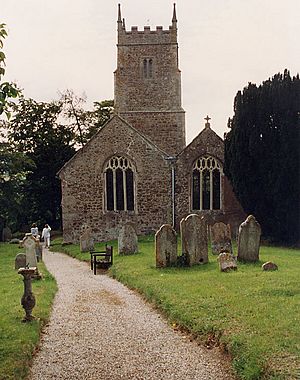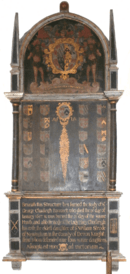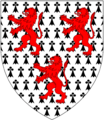Sir George Chudleigh, 1st Baronet facts for kids
Quick facts for kids
Sir George Chudleigh
|
|
|---|---|
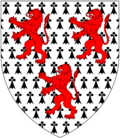
Chudleigh coat of arms
|
|
| Governor of Exeter | |
| In office 1642–1643 |
|
| Member of Parliament for Lostwithiel |
|
| In office June 1625 – August 1625 |
|
| Tiverton | |
| In office February 1624 – May 1624 |
|
| Member of Parliament for East Looe |
|
| In office April 1614 – June 1614 |
|
| Member of Parliament for Mitchell, Cornwall |
|
| In office September 1601 – December 1601 |
|
| Personal details | |
| Born | 15 June 1582 Ashton Manor, Devon |
| Died | January 15, 1658 (aged 79) Ashton Manor, Devon |
| Resting place | St John the Baptist, Ashton |
| Nationality | English |
| Spouse | Mary Strode |
| Relations | Sir William Strode; James Chudleigh; |
| Children | Nine |
| Parents | John Chudleigh (1565–1589); Elizabeth Speke (died 1628) |
| Alma mater | New College, Oxford |
| Occupation | Landowner and politician |
| Military service | |
| Allegiance | |
| Battles/wars | First English Civil War |
Sir George Chudleigh, 1st Baronet (born around 1578, died January 15, 1658), was an important English landowner and politician from Ashton, Devon. He was a Member of Parliament (MP) at different times between 1601 and 1625. He had strong family ties to a group of Presbyterians in Devon, including Sir William Strode.
Before the First English Civil War (1642–1646), Sir George generally supported Parliament. When the war began, he became a Parliamentary Lieutenant-General and Governor of Exeter. However, like many people on both sides, he hoped for a peaceful end to the conflict. He left his military role in September 1643.
From 1643 to early 1646, the Royalists controlled Devon. Sir George allowed his home, Ashton, to be used as a Royalist base. But he tried to stay out of the fighting himself. In 1647, Parliament's Sequestration Committee fined him. However, because of his connections, he avoided major punishment. Sir George Chudleigh passed away in January 1658.
Contents
Early Life and Family
George Chudleigh was born in 1578. He was the oldest son of John Chudleigh (1565–1589) and Elizabeth Speke (died 1628). His mother's father was Sir George Speke. George's grandfather was one of the "Marian exiles." These were Protestants who left England when Queen Mary I ruled from 1553 to 1558.
George's father was a friend of famous explorers like Thomas Cavendish and Sir Walter Raleigh. His father borrowed money by mortgaging his lands to fund a trip to attack Spanish colonies. This trip failed, and his father died at sea in 1589. Even though his mother inherited valuable land, she had to sell the family estates in Chudleigh. She also spent years in court cases with the few people who survived the trip.
Despite these challenges, both of George's sisters married well. Bridget (around 1584–1612) married Sir Richard Carew. Dorothy married Sir Reginald Mohun. His younger brother, John Chudleigh (around 1584–1634), became a sea captain like their father. He even sailed with Sir Walter Raleigh on his last voyage in 1617.
In 1606, George Chudleigh married Mary Strode. She was the oldest daughter of Sir William Strode. George and Mary had a large family: nine sons and nine daughters.
Political Career
George Chudleigh studied at New College, Oxford, and finished his studies in 1596 when he was 18. At that time, traveling abroad was common for gentlemen, but there is no record of him doing so. His family connections to the Carews, Mohuns, and his father-in-law, William Strode, made him part of a strong anti-Catholic, Puritan group in Devon.
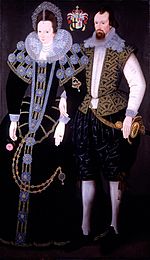
In 1601, he was elected as a Member of Parliament for St. Michaels. This was a seat controlled by the Carew family. In 1614, he became an MP for East Looe. Then, in 1621, he was elected for Lostwithiel. Both of these seats were controlled by his brother-in-law, Sir Reginald Mohun.
In 1622, he bought a baronetcy, which meant he became "Sir George." In 1624, he was elected for Tiverton, and then for Lostwithiel again in 1625. He became more involved in local government. In 1626, when he was offered the East Looe seat again, he stepped aside for his son, John.
Disputes with King Charles I
From 1625 to 1628, Sir George was deeply involved in collecting taxes for naval expeditions. These trips were led by the Duke of Buckingham. His brother, John Chudleigh, served as a senior naval commander. These expeditions were meant to help Protestants in the Thirty Years War. However, they were very expensive failures. Only Buckingham's assassination in August 1628 saved him from being removed from office by Parliament.
The naval fleets were based in Devon and Cornwall. People there were forced to feed, house, and equip the sailors. Sir George strongly objected to this on behalf of his friends and neighbors. This made him unpopular with King Charles I.
Sir John Eliot and Sir William Strode, Sir George's father-in-law, led a campaign in Parliament. They refused to grant more taxes unless the King agreed to certain guarantees. In 1629, King Charles I responded by suspending Parliament. Sir John Eliot died in the Tower of London in 1632. Sir William Strode was imprisoned until 1640. Sir George was more moderate than them. However, he also worried about the rise of the Durham House Group within the Church of England. This group threatened the religious agreements made earlier.
Role in the English Civil War
When the First English Civil War began in 1642, Sir George Chudleigh was one of Parliament's leaders in Devon. He was made governor of Exeter. Like many others, he was very reluctant to go to war. In January 1642, he traveled to London to present a petition from Devon to Parliament. This petition was one of 38 from different counties. It was the only one that asked for a peaceful agreement between King Charles and Parliament.
When the Earl of Stamford became the Parliamentary commander in the West Country, James Chudleigh, Sir George's son, became his deputy. Sir George himself was appointed Lieutenant-General of the cavalry. After a defeat at the Battle of Stratton in May, James was captured and then switched sides. The Earl of Stamford accused him of being a traitor.
Sir George was in Exeter as governor when Royalist forces surrounded the city. The Earl of Stamford was also there. After the town surrendered in early September, Sir George resigned from his military position.
He explained his reasons in a document called A declaration published in the county of Devon by that grand ambo-dexter, Sir George Chudleigh. In this document, he argued that while he opposed unfair actions by the King, "the destruction of a kingdom cannot be the way to save it." He held Ashton Manor as a Royalist base until December 1645. Then, he surrendered it to the New Model Army. In reality, he tried to avoid taking an active part in the war.
In 1647, the Sequestration Committee fined him for being a Royalist supporter. However, it's possible he never actually paid the fine.
Family Involvement in the War
Some people have suggested that Sir George's sons, George and Christopher, fought for Parliament, but there is no clear record of this. His son James died from wounds on October 6, 1643. Another son, Thomas, served in Ireland until October 1643. His regiment then returned to England. Thomas later appears as a surgeon in Exeter in 1648.
Sir George had two nephews who were involved in the war. Sir Alexander Carew was executed by Parliament in 1644. This was because he planned to betray Plymouth to the Royalists. Another nephew, John Carew, signed the document that ordered King Charles I's death in 1649. For this, he was later executed in October 1660 as a regicide (someone who kills a king).
Even though Sir George refused to take the 1650 Oath of loyalty to the Commonwealth (the government after the King), he was cleared of charges in April 1652. This was under the Act of General Pardon and Oblivion. It is not clear if his estates were ever truly taken away. He died on January 15, 1658, and was buried in St John the Baptist church in Ashton. His son George became the next baronet.
Images for kids
 | Charles R. Drew |
 | Benjamin Banneker |
 | Jane C. Wright |
 | Roger Arliner Young |


